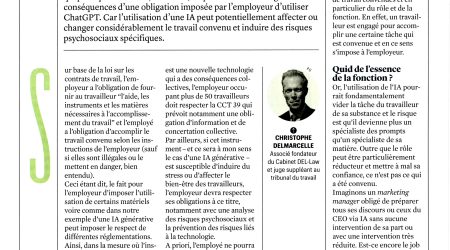A Russian worker facing discrimination could file a complaint in Belgium (Echo 25-3-2022)
Posted the 2 May 2022Ukraine, corporate reactions and the risk of discrimination
It is clear that Russia’s invasion of Ukraine is reprehensible and a violation of international law.
That said, private punitive sanctions against Russia and Russians, in addition to economic sanctions imposed by many states, raise questions and highlight the risk of discrimination based on nationality.
This is likely the first time in modern history that such extensive and numerous sanctions have been adopted by private companies, leading to a massive impact on the Russian economy, on top of the already severe economic sanctions imposed by most countries. This unprecedented involvement of private actors in geopolitics raises concerns, as the blanket condemnation of Russians without proportionality or restraint risks undermining traditional diplomacy, which aims to weigh and calibrate responses to avoid escalating tensions. It should also be noted that this type of unilateral condemnation is a stark contrast to past inaction, such as during the invasion of Iraq, which was equally a sovereign nation and also conducted without UN authorization.
This phenomenon aligns with the cancel culture of today, where immediate reactions on social media drive public opinion. However, this conflict, as condemnable as it is, must be understood within its historical and geopolitical context, especially given Russia’s status as a nuclear power with nearly 5,900 nuclear warheads. Diplomats and governments are mindful of this in their negotiations, unlike some private companies whose extreme and unnuanced reactions raise questions about corporate responsibility in international relations.
From a legal standpoint, the decisions of numerous companies to cease all activities in Russia, impose specific contractual conditions on Russian employees or consultants, or even dismiss senior Russian executives or refuse to hire Russian workers, raise significant issues under anti-discrimination laws.
In Europe, Council Directive 2000/78/EC of November 27, 2000, establishing a general framework for equal treatment in employment and occupation, prohibits direct discrimination based on nationality, including in the workplace. Such discrimination occurs when someone is treated less favorably than another person in a comparable situation without objective justification for a legitimate purpose. The directive also prohibits instructing others to discriminate against individuals on protected grounds, such as nationality.
This directive is implemented in Belgium by the Law of May 10, 2007, on discrimination, which includes criminal sanctions. In criminal law, if even one element of the offense occurs in Belgium, Belgian courts have jurisdiction. Therefore, if a Belgian company adopts discriminatory measures in Russia, Russian workers could theoretically file a criminal complaint in Belgium.
In cases of dismissal or refusal to hire in Belgium solely based on nationality, beyond criminal penalties, the affected individual could claim compensation equal to six months’ salary for damages.
While unequivocally condemning this war, supporting the Ukrainian people, and acknowledging that Russia’s actions violate international law, this legal reminder seemed necessary.
Related articles

Is an employer allowed to mandate the use of artificial intelligence tools by employees ? (Trends, 17-07-2025)

Caution if a former colleague opposed to your employer asks you to testify in their favor
